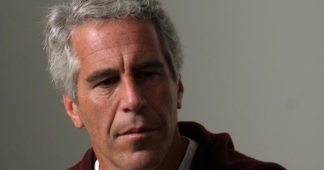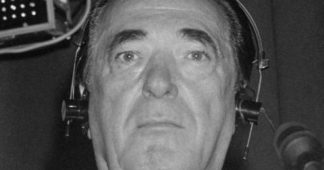fasdf
By David Walsh
31 August 2019
According to Emerson College Polling, only one-third of Americans believe that financier and alleged sex trafficker Jeffrey Epstein committed suicide August 10 at the Metropolitan Correction Center (MCC) in New York City. The survey, conducted August 24-26, found that 34 percent of those contacted believed Epstein was murdered, 33 percent believed he committed suicide and 32 percent were unsure.
The new poll essentially jibes with the results of a Rasmussen Reports poll carried out in the immediate aftermath of Epstein’s unexplained death. On August 14, Rasmussen indicated that 42 percent of Americans thought Epstein “was murdered to prevent him from testifying against powerful people with whom he associated,” while 29 percent thought he had killed himself and 29 percent were undecided.
Three weeks of US media propaganda to the effect that anyone who has doubts about the death is under the influence of “conspiracy theories” has only had a limited effect. A stubborn percentage of the population continues to be skeptical about the “official story.” As the German writer Bertolt Brecht wrote under very different circumstances, “Would it not be easier / In that case for the government / To dissolve the people / And elect another?”
In any event, even as portions of the media, out of one side of their mouths, so to speak, have worked assiduously to convince everyone that Epstein’s death was “indisputably” a suicide, out of the other, they have acknowledged important details that only serve to undermine the preferred version of events.
The latter include the fact that Epstein suffered multiple broken bones in his neck more frequently associated with strangulation than hanging, that strict instructions stipulating the financier should not be left in his cell alone were ignored by numerous prison staffers immediately prior to his death, that guards assigned to check in on him every half-hour were allegedly asleep at the time of his death, that he was taken off suicide watch and his mental condition treated with suspiciously cavalier indifference, that at least one camera outside Epstein’s cell had footage deemed unusable, etc.
Moreover, we learned this week from Epstein’s lawyers that their client, deludedly or not, was in a relatively upbeat mood. His legal team was about “to pursue an appeal regarding some of the preliminary decisions made before trial. They thought they had a high chance of success because … lawyers involved in the original 2008 non-prosecution agreement that largely let Epstein off the hook for the full measure of the allegations levied against him said it was ‘global,’ meaning that New York prosecutors would not be allowed to pursue this case. … Given their faith in the strength of this argument, they allege, Epstein’s decision to take his own life was somewhat inexplicable.”
“Portions of the media” continue to report on inconvenient and troubling aspects of the Epstein case. The New York Times for the most part is not among them. The newspaper has “crime beat” and other investigative reporters on its payroll, and the death of Epstein occurred under their jurisdiction, New York City. Evidently, the word has come down from on high—this is not a story to be covered.
There must be some reporters in the Times newsroom angered that it has been left to the Washington Post to get the scoop on a number of startling developments, including the abovementioned fact that at least “eight Bureau of Prisons staffers knew that strict instructions had been given not to leave multimillionaire sex offender Jeffrey Epstein alone in his cell, yet the order was apparently ignored in the 24 hours leading up to his death, according to people familiar with the matter.” The Times has not commented on this.
Likewise, the revelation that the camera or cameras located outside Epstein’s cell were not functioning properly has been covered widely. That information even prompted one of Epstein’s attorneys to comment, “There are conspiracy theories galore. … What if the tapes only broke down on the day he was killed or he died?”
The Times merely carried an item on its website from Reuters on the broken cameras. (In passing, one of Epstein’s lawyers shed light on the brutal character of the American prison system, noting that, according to a “person with knowledge,” defendants awaiting trial at the MCC were kept in more “dreadful” conditions than suspected terrorists held at Guantanamo Bay).
Since Jeffrey Epstein’s apprehension in July, the Times has been regularly weighing in on the need to shut down any serious investigation of the circumstances surrounding his activities and then, later, his death. It editorialized in July that Congress’s looking into Epstein’s 2008 plea deal would be “a poor use of lawmakers’ limited time and resources.” This was addressed to a legislature swollen with millionaires that spares no time or expense when it comes to prosecuting enemies or rewarding itself.
The Times jumped on the medical examiner’s conclusion August 16 that Epstein had committed suicide to argue that the terse statement from New York City’s chief medical examiner, Dr. Barbara Sampson, “refutes conspiracy theories that he may have been murdered.”
The Times went on to assert that “Mr. Epstein’s death had set off a wave of unfounded conspiracy theories, as people speculated online, without evidence, that he might have been killed to keep him from providing information to prosecutors about others in his social circle, including President Trump, former President Bill Clinton and Prince Andrew of Britain.”
As the WSWS has noted previously, Epstein was associated with many high-placed, dangerous people. His particular obsessions, in fact, allegedly included seeking out and drawing in the wealthy and influential and entangling them in various sexual and drug fantasies of his, or perhaps theirs. This was all very well when Epstein was out and about, and seemingly immune to serious prosecution. Once he was taken into custody and facing years in prison, however, there was genuine cause for alarm.
The Times did lift the lid a little in the form of columnist James B. Stewart’s August 12 piece, “The Day Jeffrey Epstein Told Me He Had Dirt on Powerful People.” Stewart explained that the “overriding impression” he drew from an August 2018 conversation with Epstein was that the multimillionaire “knew an astonishing number of rich, famous and powerful people. … He also claimed to know a great deal about these people, some of it potentially damaging or embarrassing, including details about their supposed sexual proclivities and recreational drug use. So one of my first thoughts on hearing of Mr. Epstein’s suicide was that many prominent men and at least a few women must be breathing sighs of relief that whatever Mr. Epstein knew, he has taken it with him.”
Epstein told Stewart that his very notoriety “was what made so many people willing to confide in him. Everyone, he suggested, has secrets and, he added, compared with his own, they seemed innocuous. People confided in him without feeling awkward or embarrassed, he claimed.” At another point in the conversation, he told the Times reporter “he was considering becoming a minister so that his acquaintances would be confident that their conversations would be kept confidential.”
If such dialogue were to occur in a scene from an Orson Welles film of the proper vintage, The Lady from Shanghai or Confidential Report, for example, or any decent film noir from the late 1940s, the viewer would instantly know what it meant. A character who spoke such lines would shortly disappear and an intrepid reporter would dedicate him or herself to tracking down those responsible for his death.
The Epstein affair is not a film, and the events of August 10 remain obscure. But is there not enough in the unexplained facts and Stewart’s piece alone to prompt an honest publication, with a fraction of the Times’ resources, into launching a genuinely searching investigation?
The newspaper, which downplays the possibility of foul play and generally protests too much against “conspiracy,” exudes about as much trustworthiness and sincerity as Saudi authorities following the October 2018 death of Jamal Khashoggi.
The government of Crown Prince Mohammed bin Salman (coincidentally, another associate of Epstein, who visited the New York financier “many times” and with whom Epstein “spoke often,” according to Stewart) initially denounced allegations of Riyadh’s involvement in the disappearance of Khashoggi from its Istanbul consulate as a “conspiracy theory” and suggested the journalist and Saudi dissident had merely left through the back door!
The Times is part of the New York City’s financial and political establishment. Its editors hobnob with these circles, imbibe their atmosphere, share their outlook, partake of their wealth, learn their secrets.
One is entitled to ask: What is the editorial board of the Times so anxious about coming to light? Whom might it be protecting?
Published at https://www.wsws.org/en/articles/2019/08










